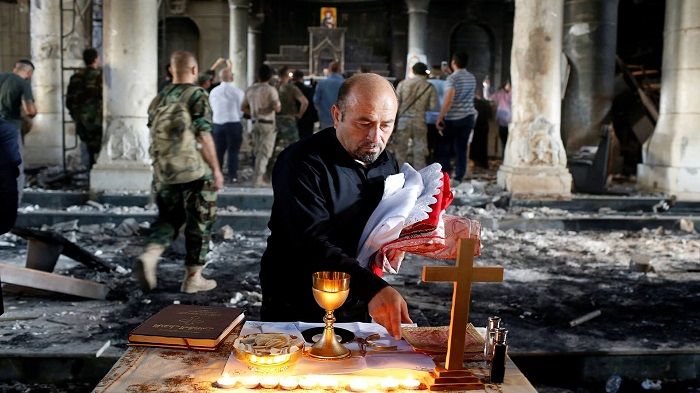100000 Christians Are Killed Every Year for Their Faith
100000 Christians Are Killed Every Year for Their Faith
Ongoing Violations of Christian Rights: A Grim Reality and Proposed Solutions
Religious freedom is a fundamental right enshrined in international law, and any society cannot develop and thrive without respecting individuals’ rights to practice their beliefs. However, many Christians around the world live under the weight of persecution and discrimination. Statistics indicate that approximately 100,000 Christians are killed annually for reasons related to their faith, a troubling figure that reflects the extent of violations in the Middle East, Africa, and Asia.
The current situation requires a deep understanding of the underlying causes of these violations, as well as exploring possible ways to address them. This issue not only affects individual rights but also concerns the social and economic stability of diverse communities.

Violations in the Middle East
Current Situation
The Middle East witnesses high levels of religious persecution, where Christian communities face various forms of violations. Reports indicate that many Christians are forced to leave their homes due to violence and discrimination, leading to the erosion of traditional Christian communities
. In some countries, churches have become targets of attacks, highlighting the increasing intolerance towards other religions. Christians in these areas face repeated threats, resulting in a profound sense of insecurity. The situation in countries like Iraq and Syria demonstrates how armed conflicts have destroyed the infrastructure of communities, making everyday life extremely difficult for Christians.
Main Causes
The reasons behind these violations are varied, ranging from sectarian conflicts to religious fanaticism. Terrorism is a crucial part of the problem, with extremist groups specifically targeting Christians. This phenomenon feeds on a culture of hatred and extremism, leading to escalating violence. Poor laws and institutional discrimination also play a role in exacerbating these violations, as some laws are used to justify discrimination against minorities. Observers show that these violations are not isolated incidents but part of a growing pattern of violence against minorities.
Effects of Conflicts on Christian Communities
Armed conflicts in some Middle Eastern countries, such as Iraq and Syria, have led to the displacement of large numbers of Christians. Many now live as refugees in other countries, affecting their cultural and religious identity. This displacement is not merely a loss of home; it entails a loss of identity and belonging. Moreover, these communities face numerous challenges in preserving their cultural and religious heritage, putting their rich history at risk. This forced displacement is considered a humanitarian crisis requiring urgent response from the international community.
Forced Displacement
Forced displacement is one of the most critical issues faced by Christians in the Middle East. Many families are compelled to leave their homes due to ongoing threats, leading to the fragmentation of families and loss of social ties. These displaced individuals struggle to adapt to new lives in host countries, where the levels of support and assistance vary significantly. The loss of social and religious identity causes profound psychological pain, necessitating the creation of psychological and social support programs to help them adapt.
Challenges in Africa
Racial Discrimination
In Africa, Christians face racial discrimination, with some areas considered extremely dangerous for Christians due to tribal and religious conflicts. Reports of attacks on Christians, including assaults on churches and killings, are increasing. Many activists express concern over the escalation of this phenomenon, requiring intervention from the international community. The rise of violence in countries like Nigeria demonstrates that the situation is worsening, demanding urgent responses. The violence against Christians in these areas is part of a broader struggle involving religion, ethnicity, and power.
Social and Economic Impact
These violations lead to the disintegration of local communities and an increase in poverty. Many Christians are forced to leave their countries in search of safety, resulting in the loss of skilled labor and vital resources for communities. This situation negatively impacts economic and social development in affected areas. Additionally, the loss of individuals who contribute to the local economy increases pressure on infrastructure and essential services. This social decline leads to a breakdown of trust among different communities, exacerbating polarization.
Impact of Conflicts on Education
These violations also affect education, as many children are forced to leave school due to fear of violence or displacement. Education is a cornerstone for building a better future, but conflicts lead to the destruction of educational infrastructure, worsening the crisis of ignorance and poverty. Education is the key to progress, and under current circumstances, future generations face the risk of losing access to quality education. International efforts are needed to rebuild schools and provide safe education for affected children.
Experiences of Christian Communities
Christian communities in Africa are among the most culturally influential, yet they face significant challenges. Many live in a state of fear and anxiety, impacting their quality of life. Activists show how poor economic conditions exacerbate ethnic and religious tensions, leading to further violence and discrimination. This situation requires immediate responses from governments and international organizations to provide protection and support for these individuals.
Violations in Asia
Challenges in India and China
India and China are among the countries witnessing severe violations of Christian rights. In India, incidents of violence against Christians are increasing, with churches being targeted and Christian communities attacked. A recent report indicates that assaults on Christians have risen significantly, necessitating a strong response from the government and the international community. In China, strict restrictions are imposed on religious practice, and Christian groups face immense pressure from the government, threatening their existence.
Laws and Surveillance
Strict laws and government surveillance restrict religious freedom, making it difficult to practice religious rituals. Many Christians are forced to practice their faith in secrecy for fear of arrest. This situation represents a blatant violation of human rights and requires immediate redress. Such surveillance also leads to a culture of fear and distrust among communities, increasing divisions. There should be global calls for change in these repressive policies.
Personal Experiences of Victims
Personal testimonies from victims reveal the extent of the cruelty they endure. Many women speak of torture and detention, while children recount stories of losing parents or friends. These experiences reflect deep suffering that needs to be highlighted. These stories are not just numbers or statistics; they are human experiences that illustrate the pain and suffering many endure. These testimonies should be collected and presented on international platforms to raise awareness.
Recommendations
Enhancing International Awareness
The international community must intensify its efforts to raise awareness of the violations faced by Christians. This can be achieved through organizing international conferences and workshops focused on religious freedom. Additionally, media outlets should highlight these violations more robustly. Spreading information can help mobilize communities to act and stand in solidarity with victims. Awareness campaigns aimed at educating people about the importance of respecting minority rights are crucial.
Pressuring Governments
Governments and international organizations must exert pressure on countries that violate the rights of Christians. Clear sanctions should be in place for failing to protect minority rights. These sanctions may include withholding aid or trade with countries that do not respect human rights. Disregarding human rights should be considered sufficient grounds for international intervention. The ongoing nature of these violations underscores the urgent need for effective international action.
Supporting Local Communities
Providing financial and moral support to local Christian communities can help enhance their ability to face challenges. This support should include building churches and providing education and healthcare. International support can play a vital role in empowering these communities. Providing necessary resources can contribute to building a better future and strengthen communities’ resilience in the face of challenges. Programs should include vocational training to support individuals in rebuilding their lives.
Promoting Interfaith Dialogue
Interfaith dialogue is a crucial step toward fostering understanding and tolerance. Initiatives that bring together religious leaders from diverse backgrounds to promote tolerance should be encouraged. These initiatives can help reduce tensions and achieve peace. Greater emphasis should be placed on organizing cultural and religious events that foster positive interaction between different religions. Promoting dialogue can contribute to spreading a culture of peace and tolerance.
Establishing Human Rights Monitoring Mechanisms
International mechanisms should be established to monitor human rights, including tracking violations against Christians. These mechanisms can play a role in gathering information and providing support to victims. Having an effective human rights monitoring system can significantly impact improving the current situation. Regular reports should be presented to international organizations to provide a clear picture of the current status.

Conclusion
Violations against Christians remain a vital issue requiring urgent responses from the international community. By raising awareness, pressuring governments, and supporting local communities, we can work toward a more just and inclusive world where the right to religious freedom is respected. Achieving these goals requires the concerted efforts of all stakeholders to ensure that the rights of all individuals are prioritized, regardless of their beliefs.
We need to build a world characterized by tolerance and mutual respect, where everyone can practice their faith freely and safely. Working toward these goals is not just a moral obligation; it is a humanitarian necessity to ensure a better future for all.
The Importance of International Solidarity
International solidarity with persecuted Christian communities is essential for achieving change. Governments and humanitarian organizations must work together to ensure that the voices of those facing persecution are heard. Supporting human rights is a global ethical duty, and we must all strive for a world free from discrimination and religious violence. Achieving this goal requires comprehensive international cooperation that transcends political and cultural boundaries.
Call to Action
We urge all individuals and communities to engage and participate in efforts to protect the rights of Christians. We must all be a voice for the voiceless and work to raise awareness and foster solidarity. Every small step toward change can make a significant difference in the lives of those suffering.
The Desired Future
We should aspire to a future where the right to religious freedom is respected, enabling everyone to practice their faith without fear or discrimination. Building a peaceful world requires us all to take responsibility and work together to achieve this noble goal.
Related Topics
- Jesus on the Cross Loved Me and Sacrificed Himself for Me
- Holy Fire Miracle in the Church of the Holy Sepulcher
Who Is St. Valentine & What Is the Truth of Valentine’s Day
Sylvester Stallone Give His Life To Jesus Christ






